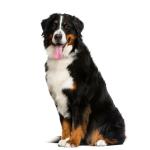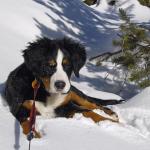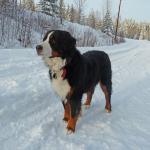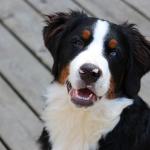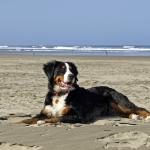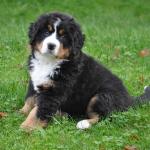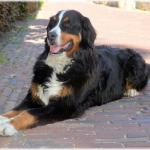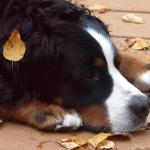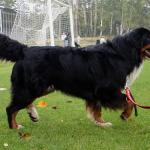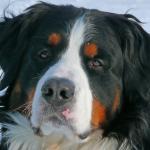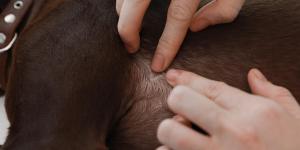Bernese Mountain Dog
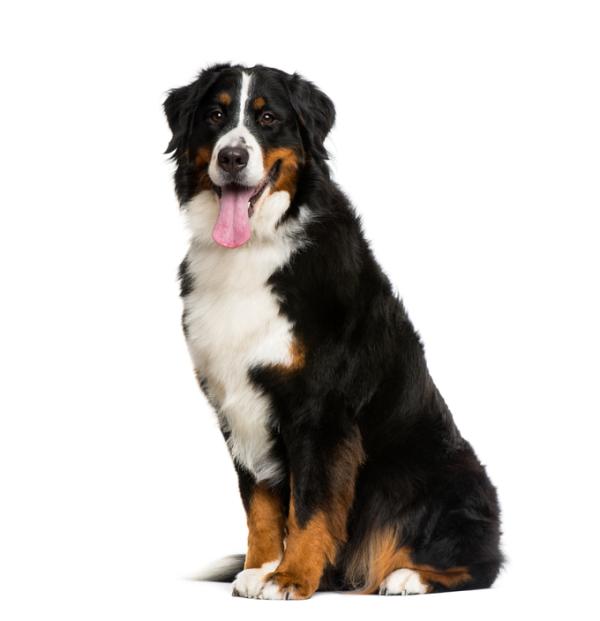
The Bernese Mountain Dog is a beautiful, family-oriented breed that gives excellent results in search and rescue and therapy support. These dogs are calm, docile and sociable, besides being very clever. They are not suitable for apartments or small houses, as they need lots of physical exercise and access to the outdoors to stay healthy and happy.
If you are considering adopting a Bernese Mountain Dog, in this AnimalWised file we will go over everything you need to know about this breed's temperament, care, training and history.
- Europe
- Switzerland
- Group II
- 5-14
- 14-18
- 18-22
- 22-27
- 27-31
- More than 31
- 2-7
- 7-22
- 22-55
- 55-100
- 100-220
- 8-10
- 10-12
- 12-14
- 15-20
- Low
- Meidum
- High
Origin of the Bernese Mountain Dog
The Bernese Mountain Dog descends from the old farm dogs that inhabited the Alpine hills and plains near Bern, Switzerland, and were used as guardians, shepherds and to pull light carts carrying dairy products.
They were originally known as Dürrbächler: according to the FCI breed standard the name referred to the fact that they were frequently seen in the town of Dürrbach in the canton of Bern, especially near a particular inn. In 1910, their name was changed to the one they get now.
Over time, the Bernese Mountain Dog gained popularity as a family, show and working dog because of their good temper and beauty. Nowadays, they are the most popular of the four Sennenhund or Swiss mountain dog breeds and they are beloved all around the world.
Physical traits of the Bernese Mountain Dog
Bernese Mountain Dogs are about 64 to 70 cm (25 to 27.5 in) tall at the withers and weigh around 50 kg (110 lb). With their tricolor long coat and large size, these dogs are quite stunning. Their head is large but proportionate, with a notable but not too obvious stop. Their nose is black, and their eyes are brown and almond-shaped. Their ears are medium-sized and triangle-shaped, with a roundish tip, and placed high on their heads.
Their silhouette is slightly longer than it is tall, with a gently descending line from the neck to the withers that then becomes flat. The chest is wide, long and deep, with a slightly rising belly. The tail is long and hangs when the dog is at rest; when in action, it is carried to the level of the back or above.
The most recognizable trait of the breed is the coat: it is long, shiny and straight or slightly wavy. The ground color is black, with reddish brown and white markings in a particular pattern.
Temperament of the Bernese Mountain Dog
Although Berners were used as guardian dogs in the past, their temperament is closer to that of family dogs. When they have matured, they become calm, independent, confident, docile, stable, and generally peaceful.
Like any other dog, the Bernese Mountain Dog must be socialized as a puppy. The process is usually easy thanks to their pleasant temperament: although they can be reserved with strangers, they are not usually aggressive. They get along with children, but in adulthood they are not very playful. They usually cohabit well with other dogs and pets.
Caring for a Bernese Mountain Dog
Bernese Mountain Dogs must be brushed three times every week as a regular routine, and every day during the shedding season.
They need to get daily physical exercise, and it will be necessary to go for two daily walks at the very least. One of these walks should be long, and if possible they should be able to socialize and interact with other dogs and play games at ease. Although they are calm and stable, Bernese Mountain Dogs do not adapt well to living in apartments because of their high exercise needs and their large size.
It's best if you have a garden where they can run around whenever they feel like it. Berners require plenty of company, so they will prefer to live indoors and use the garden to stretch their legs and enjoy the open air. If you do have a garden, your dog will be happy whether you live in the countryside or the city.
Training a Bernese Mountain Dog
It is easy to train Berners if you use positive reinforcement. More traditional obedience training can also give good results, but only with experienced trainers who do not punish or mistreat the dog. Bernese Mountain Dogs can learn all sorts of skills and tricks, as they are very smart, but you must bear in mind they are not as agile as Belgian Shepherds or Border Collies.
The main behavioral issue of Bernese Mountain Dogs is that they can become destructive if they do not get enough exercise or company.
Common health problems of Bernese Mountain Dogs
The most common diseases and conditions of this breed are hip and elbow dysplasia, histiocytosis, osteochondritis dissecans or OCD, gastric torsion and progressive retinal atrophy. Heat stroke is also quite common because of their thick coat, so you must be very careful if you live in a mild to hot climate.
Bernese Mountain Dog photos
